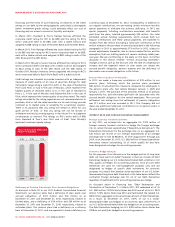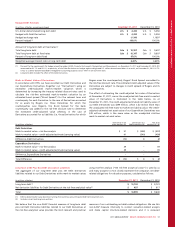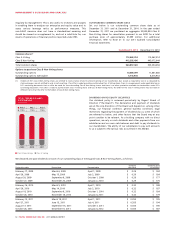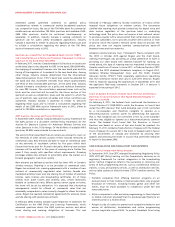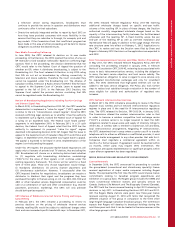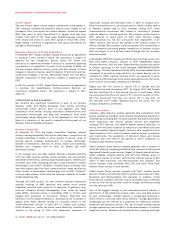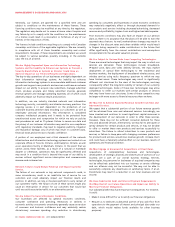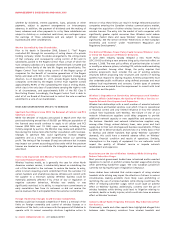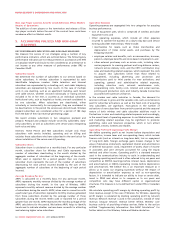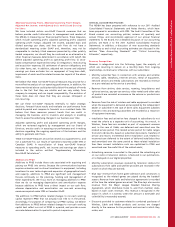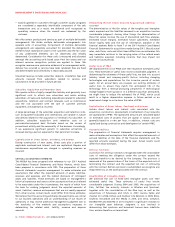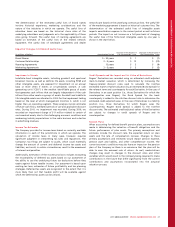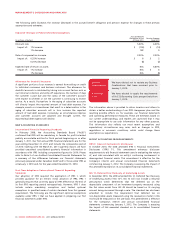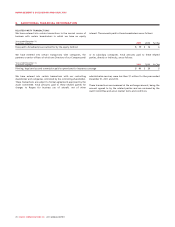Rogers 2011 Annual Report Download - page 64
Download and view the complete annual report
Please find page 64 of the 2011 Rogers annual report below. You can navigate through the pages in the report by either clicking on the pages listed below, or by using the keyword search tool below to find specific information within the annual report.MANAGEMENT’S DISCUSSION AND ANALYSIS
Generally, our licences are granted for a specified term and are
subject to conditions on the maintenance of these licences. These
licencing conditions may be modified at any time by the regulators.
The regulators may decide not to renew a licence when it expires and
any failure by us to comply with the conditions on the maintenance
of a licence could result in a revocation or forfeiture of any of our
licences or the imposition of fines.
The licences include conditions requiring us to comply with Canadian
ownership restrictions of the applicable legislation. We are currently
in compliance with all of these Canadian ownership and control
requirements. However, if these requirements are violated, we would
be subject to various penalties, possibly including, in the extreme
case, the loss of a licence.
We Are Highly Dependent Upon our Information Technology
Systems and the Inability to Enhance our Systems or Prevent a
Security Breach (Data or System) or Disaster Could Have an
Adverse Impact on our Financial Results and Operations.
The day-to-day operations of our businesses are highly dependent on
their information technology systems. An inability to enhance
information technology systems to accommodate additional customer
growth and support new products and services could have an adverse
impact on our ability to acquire new subscribers, manage subscriber
churn, produce accurate and timely subscriber invoices, generate
revenue growth and manage operating expenses, all of which could
adversely impact our financial results and position.
In addition, we use industry standard network and information
technology security, survivability and disaster recovery practices. Our
ongoing success is in part dependent on the protection of our
corporate business sensitive data including our customers’ as well as
employees’ personal information. This information is considered
company intellectual property and it needs to be protected from
unauthorized access and compromise for which we rely on policies
and procedures as well as IT systems. Failure to secure our data and
the privacy of our customer information may result in non-compliance
with regulatory standards, may lead to negative publicity, litigation
and reputation damage, any of which may result in customer losses,
financial losses and an erosion of public confidence.
A portion of our employees and critical elements of the network
infrastructure and information technology systems are located at our
corporate offices in Toronto, Ontario, and Brampton, Ontario, as well
as an operations facility in Markham, Ontario. In the event that we
cannot access these facilities, as a result of a natural or manmade
disaster or otherwise, operations may be significantly affected and
may result in a condition that is beyond the scope of our ability to
recover without significant service interruption and commensurate
revenue and customer loss.
Network Failures Could Reduce Revenue and Impact Customer
Service.
The failure of our networks or key network components could, in
some circumstances, result in an indefinite loss of service for our
customers and could adversely impact our financial results and
position. In addition, we rely on business partners to carry certain of
our customers’ traffic. The failure of one of these carriers might also
cause an interruption in service for our customers that would last
until we could reroute the traffic to an alternative carrier.
We Are Subject to General Economic Conditions.
Our businesses are affected by general economic conditions,
consumer confidence and spending. Recessions or declines in
economic activity or economic uncertainty generally cause an erosion
of consumer and business confidence and may materially reduce
discretionary consumer spending. Any reduction in discretionary
spending by consumers and businesses or weak economic conditions
may materially negatively affect us through decreased demand for
our products and services including decreased advertising, decreased
revenue and profitability, higher churn and higher bad debt expense.
Poor economic conditions may also have an impact on our pension
plans as there is no assurance that the plans will be able to earn the
assumed rate of return. As well, market-driven changes may result in
changes in the discount rates and other variables which would result
in Rogers being required to make contributions in the future that
differ significantly from the current contributions and assumptions
incorporated into the actuarial valuation process.
We Are Subject to Various Risks from Competing Technologies.
There are several technologies that may impact the way in which our
services are delivered. These technologies include broadband,
IP-based voice, data and video delivery services, the mass market
deployment of optical fibre technologies to the residential and
business markets, the deployment of broadband wireless access, and
wireless services using radio frequency spectrum to which we may
have limited access. These technologies may result in significantly
different cost structures for the users of the technologies, and may
consequently affect the long-term viability of certain of our currently
deployed technologies. Some of these new technologies may allow
competitors to enter our markets with similar products or services
that may have lower cost structures. Some of these competitors may
be larger with more access to financial resources than we have.
We May Fail to Achieve Expected Revenue Growth from New and
Advanced Services.
We expect that a substantial portion of our future revenue growth
will be achieved from new and advanced services. Accordingly, we
have invested and continue to invest significant capital resources in
the development of our networks in order to offer these services.
However, there may not be sufficient consumer demand for these
new and advanced services. Alternatively, we may fail to anticipate or
satisfy demand for certain products and services, or may not be able
to offer or market these new products and services successfully to
subscribers. The failure to attract subscribers to new products and
services, or failure to keep pace with changing consumer preferences
for products and services, would slow revenue growth, increase churn
and could have a materially adverse effect on our business, results of
operations and financial condition.
We May Engage in Unsuccessful Acquisitions or Divestitures.
Acquisitions of complementary businesses and technologies,
development of strategic alliances and divestitures of portions of our
business are a part of our overall business strategy. Services,
technologies, key personnel or businesses of acquired companies may
not be effectively assimilated into our business or service offerings
and our alliances may not be successful. We may not be able to
successfully complete any divestitures on satisfactory terms, if at all.
Divestitures may result in a reduction in our total revenues and net
income.
We Have Substantial Debt and Interest Payment Requirements
that May Restrict our Future Operations and Impair our Ability to
Meet our Financial Obligations.
Our substantial debt may have important consequences. For instance,
it could:
• Make it more difficult for us to satisfy our financial obligations;
• Require us to dedicate a substantial portion of any cash flow from
operations to the payment of interest and principal due under our
debt, which would reduce funds available for other business
purposes;
60 ROGERS COMMUNICATIONS INC. 2011 ANNUAL REPORT


